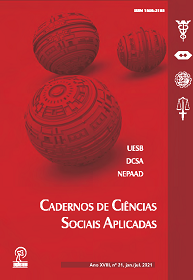Impossibility of wage garnishment: the STJ and the legislative change
DOI:
https://doi.org/10.22481/ccsa.v18i31.7887Keywords:
Human dignity. Impossibility. Patrimonial liability.Abstract
The present research rests on the institute of wage immobilization. While the CPC of 1973 treated the salary as absolutely unreliable, the CPC of 2015 established that the salary is unreliable and removed the entry “absolutely”. Thus, the understanding that emanates from the doctrine and also from the jurisprudence is due to the possibility of attachment, having as limit the guarantee of dignified evidence for debtors and their family. A research seeks to investigate how this topic was understood by scholars of subjects and what is the interpretation that the STJ (Superior Court of Justice) has given in the specific case. The present study was based on documentary analysis, jurisprudential analysis and bibliographic review, mainly, such as the works of Marcelo Abelha, Misael Montenegro Júnior and Marcus Vinicius Rios Gonçalves, among others. With a research it was possible to verify how the STJ was building its jurisprudential understanding still under the CPC of 1973 and, even now facing a certain threat of retrogression, a research signals that is not possible to cut or modify its understanding, violating all this jurisprudential construction experienced over the years.
Downloads
References
ABELHA, Marcelo. Manual de Direito Processual Civil. 6ª ed., rev., atual. e ampl. Rio de Janeiro: Forense, 2016.
ALVIM, Eduardo Arruda; GRANADO, Daniel Willian; FERREIRA, Eduardo Aranha. Direito Processual Civil. 6ª edição. São Paulo: Saraiva Educação, 2019.
ARENHART, Sérgio Cruz. A Penhorabilidade de Imóvel de Família de Elevado Valor e de Altos Salários. Revista Páginas de Direito, Porto Alegre, ano 8, nº 790, 25 de junho de 2008. Disponível em: https://www.paginasdedireito.com.br/index.php/artigos/64-artigos-jun-2008/6025-a-penhorabilidade-de-imovel-de-familia-de-elevado-valor-e-de-altos-salarios. Acesso em 16 de maio de 2020.
BRASIL. Código de Processo Civil, Lei nº 13.105, de 16 de março de 2015. Disponível em: <http://www.planalto.gov.br/ccivil_03/_ato2015-2018/2015/lei/l13105.htm> Acesso em: 09 de março de 2020.
BRASIL. Câmara dos deputados. Projeto de Lei nº 5.320 de 2019. Altera o Código de Processo Civil, Lei nº 13.105, de 16 de março de 2015. Disponível em: https://www.camara.leg.br/propostas-legislativas/2222807. Acesso em 20 de dezembro de 2019.
CÂMARA, Alexandre Freitas. O Novo Processo Civil Brasileiro. São Paulo: Atlas, 2015.
GONÇALVES, Marcus Vinícius Rios. Direito Processual Civil Esquematizado. 8ª edição. São Paulo: Saraiva, 2017.
MACHADO, Antônio Cláudio da Costa. Código de Processo Civil Interpretado: artigo por artigo, parágrafo por parágrafo. 6ª edição, revista e atual. Barueri, São Paulo: Manole, 2007.
MONTENEGRO FILHO, Misael. Curso de Direito Processual Civil. 12ª edição, reform. e atual. São Paulo: Atlas, 2016.
NEVES, Daniel Amorim Assumpção. Manual de Direito Processual Civil – Volume único. 10ª. edição. Salvador: Ed. JusPodivm, 2018.
PIOVESAN, Flávia. Direitos humanos e o direito constitucional internacional. São Paulo: Saraiva, 12ª edição, 2011.
THEODORO JÚNIOR, Humberto. Curso de Direito Processual Civil, volume III. 49ª ed., rev., atual. e ampl. Rio de Janeiro: Forense, 2016.
Downloads
Published
How to Cite
Issue
Section
License
Copyright (c) 2021 Cadernos de Ciências Sociais Aplicadas

This work is licensed under a Creative Commons Attribution-NonCommercial 4.0 International License.






